The Rise of the Grand Challenges Scholars
A DROP OF RAIN CHANGED JOSHUA NEUTEL’S LIFE.
Neutel, B.S. CHEM ’19, had already earned some impressive accolades, including Forbes’ Under 30 Scholar, Presidential Scholar, Viterbi Fellow and the Albert Dorman Future Leader Award. But he says his greatest academic achievement came in 2018 when was working with USC Viterbi’s Chapter of Engineers Without Borders to devise an innovative way to collect rainwater for a remote community in Antigua, Guatemala.
The village faced a severe water supply and contamination problem. “To this day, the filtration system has impacted the everyday lives of thousands of people in Antigua,” Neutel said. What’s more, the project shifted his mindset and career trajectory “forever.”
Neutel followed up by designing a line of “survival clothing” for refugees fleeing violence or environmental disasters — part of a yearlong course called Innovation in Engineering Design for Global Challenges, offered by the Sonny Astani Department of Civil and Environmental Engineering. He and 36 other USC students from across seven schools visited refugee camps in Greece to conduct user research and work alongside refugees and local aid organizations. These projects, integrated into his rigorous chemical engineering curriculum, allowed him to put theory into practice in a way that is rarely seen at engineering schools.
On May 10, Neutel was one of 46 students to graduate as NAE Grand Challenges Scholars.
The Grand Challenges Scholars comprise some of the United States’ best and brightest engineering students, committed to solving some of the biggest issues facing the world. Their unique interdisciplinary, entrepreneurial, service-learning and global educational experience equips them to come up with ways to address the National Academy of Engineering’s 14 Grand Challenges for planet Earth.
The Grand Challenges Scholars aren’t limited to college students. Kamilah Clark, an eighth grader from George B. Dealey Montessori School in Dallas, Texas, started her Grand Challenges Scholar journey even earlier. Along with Adrienne Walker from Da Vinci Science High School in El Segundo, California, and Ayah League from Mayfair High School in Lakewood, California, Clark participated in HackSC Jr., a pre-college “hackathon” organized by USC Viterbi computer science students and aimed at increasing the participation of young women and students from underrepresented backgrounds in tech. The event stirred Clark’s passion to apply her newly learned coding languages (eight) to solve wicked problems. Following HackSC Jr., she launched her first project, Create, a digital platform designed to encourage young authors to read and write more — and imagine themselves as the next J.K. Rowling.
Dean Yannis C. Yortsos is one of the architects behind the Grand Challenges Scholars Program, now adopted by more than 122 universities in the United States and 33 overseas. As a result, USC Viterbi empowers students at all stages of their educational journeys to tackle some of the most important challenges of the 21st century, from making solar energy cost-competitive with coal and providing clean water for nearly 1 billion people around the world.
USC Viterbi has graduated 163 of Grand Challenges Scholars since 2012 — more than any other engineering school in the country. But the seeds, in the cases of Clark, Walker and League, are planted far, far earlier.
“You can describe all of engineering with four words,” said C. D. Mote Jr., recently retired NAE president and a proponent of the program. “Creation. Solutions. People. Society. All of engineering creates solutions or value for people and society. My hope for engineering is that this understanding of engineering’s responsibility would be propagated all over the world. I can only see one way that this is going to happen, through these students. They are the future.”
Here are this year’s Grand Challenges Scholars who have ties to USC.
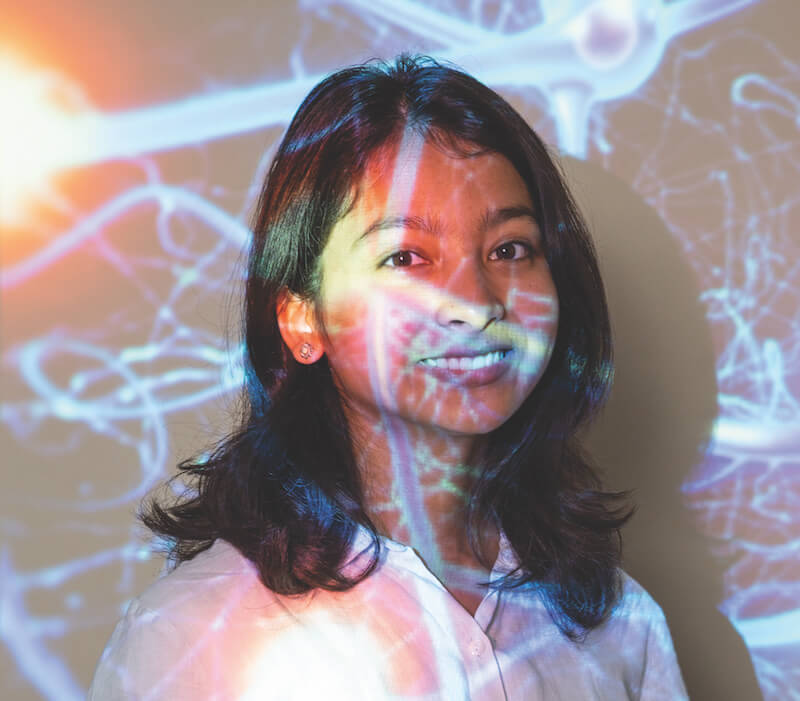
Nina Singh
B.S. BE ’19, USC Viterbi
Biggest accomplishment: Co-founding and leading Violence Intervention Volunteers, a club whose members volunteer with victims of child abuse and neglect. Working with these kids every week challenged me to think about the different ways that community members can help with their healing process.
Grand challenge: Advancing health informatics. As a future physician, I hope to use my biomedical engineering background to help collect and analyze data that will improve patient care. How can tracking global antibiotic resistance patterns help us make better individual treatment decisions? Can neural networks be used on MRI data to reduce the number of images we need to acquire during each scan? The possibilities are endless.
Heroes: My grandfather, Tej Kumar Singh, who recently passed away. His fierce determination to accomplish anything he set his mind to and his tendency to go out of his way to help people continue to inspire me.
Favorite science experiment as a child: Making a Mentos-soda geyser! Anything that exploded.
Favorite quote: “If you want to succeed to prove yourself to others, the fear of failure will always be lurking around the next corner. If, however, you want to succeed because you love the excitement of pushing your potential and exploring your world and new experiences, then you will win.” — Cal Newport
Bucket list: Go skydiving, see the Great Barrier Reef before it dies, paint a street mural, become a good photographer, visit space.
Favorite invention: FaceTime
If you could put a message on a billboard, what would it say? “Be present.”
Most significant teacher or mentor: Professor Mitul Luhar mentored me, in creating mechanical and mathematical models of cilia. His patience and confidence in our ability to navigate new challenges in the lab helped us both grow a lot as engineers and researchers.
Wildest dream: I’d really like to visit space. Here’s hoping that NASA is in need of an engineer-turned-doctor on one of their upcoming missions!
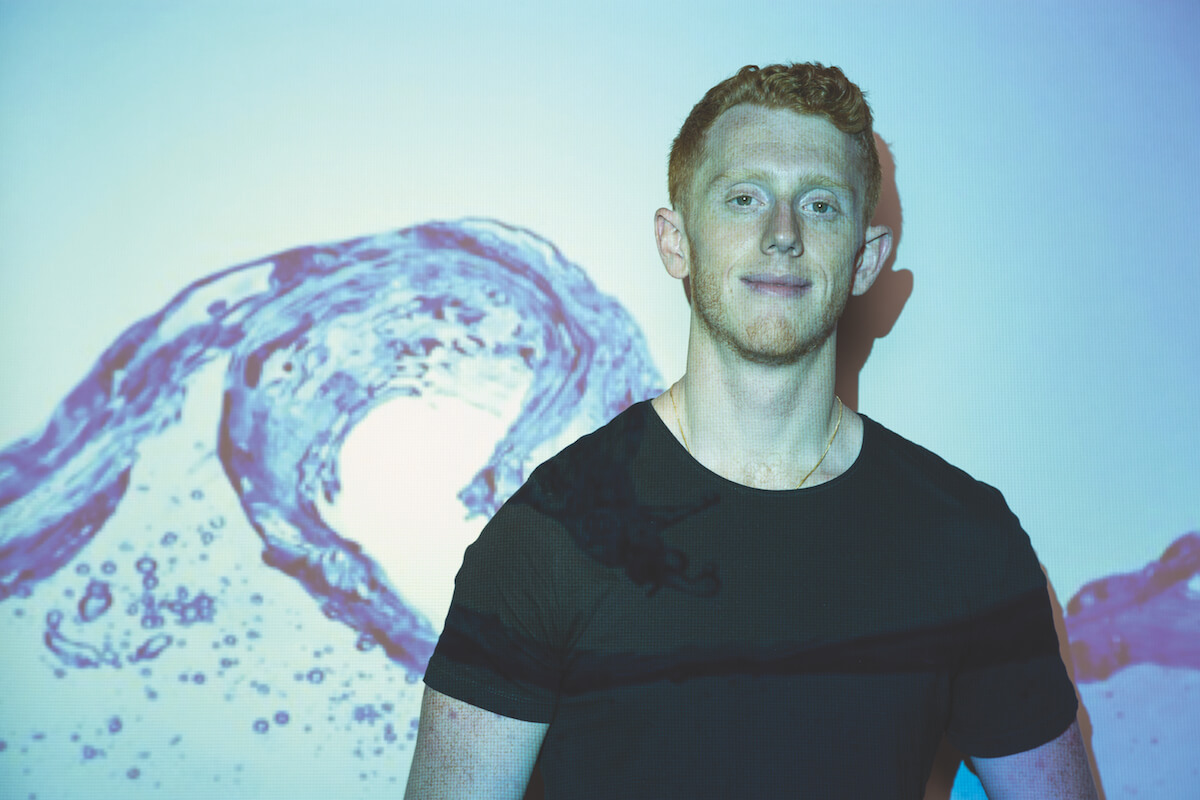
Joshua Neutel
B.S. CHEM ’19, USC Viterbi
Biggest accomplishment: Delivering clean water to an NGO called Common Hope in Antigua, Guatemala. As project manager of USC’s Engineers Without Borders chapter, I helped design and implement a water filtration system for this community. To date, the filtration system has impacted the everyday life of thousands of people in Antigua. My definition of success is simple: I have succeeded when I have made a positive impact on the world. To date, this is the most positive impact I have generated in a single action.
Grand challenge: My singular mission is to reverse the course of global warming. This crosses three Grand Challenges: making solar energy economical, providing energy from fusion and developing carbon sequestration methods. My dream is to create a sustainable design and engineering firm focused solely on innovations that could thwart global warming.
Heroes: David Neutel, my dad, the hardest-working guy I know and someone who taught me a great deal about life. Marcel Neutel, my grandfather, the patriarch of my family and a Holocaust survivor, who taught me the importance of family, respect, bravery and Judaism. Albert Dorman, the founder of Fortune 500 engineering firm AECOM, whom I had the honor of meeting after winning the Albert Dorman Future Leader Award. Elon Musk, a creative thinker, a trailblazer, an entrepreneur and a builder who builds the unimaginable during the same amount of time others are debating whether such a build is even possible.
Favorite science project as a child: A competition posed to my fifth grade class: build the smallest container in volume around a raw egg that could survive a three-story fall off of a building. I can’t remember if I won, but I enjoyed putting it together! Hopefully this was a glimpse into the future of a long and successful career.
Favorite quote: “When you want to succeed as bad as you want to breathe, then you’ll be successful.” — Eric Thomas
Bucket list: Visit every continent, all seven natural wonders of the world and the Amazon rainforest; get married and have children.
Favorite invention: The internet.
If you could put a message on a billboard, what would it say? “Do something today to make the world better.”
Most significant teacher or mentor: Brad Cracchiola, Burcin Becerik-Geber, David Gerber and Daniel Druhora. These were my co-instructors in the Innovation for Engineering Design for Global Challenges course. They inspired me to pursue a career in design, and my experiences with them in the classroom only cemented my desire to specifically design for the purpose of making the world a better place. I could go on about the values I learned from them, but to name a few, what user-focused design is, how important empathy is in user design, the importance of user research; the two steps forward/one step back nature of design, and in design, as in life, that perfect is often the enemy of done. Outside the classroom, they helped me grapple with questions like why do bad things happen to good people, and why should I design if my solution can only reduce, not eliminate, their suffering?
Wildest dream: To play in the NBA — or at the very least to dunk!
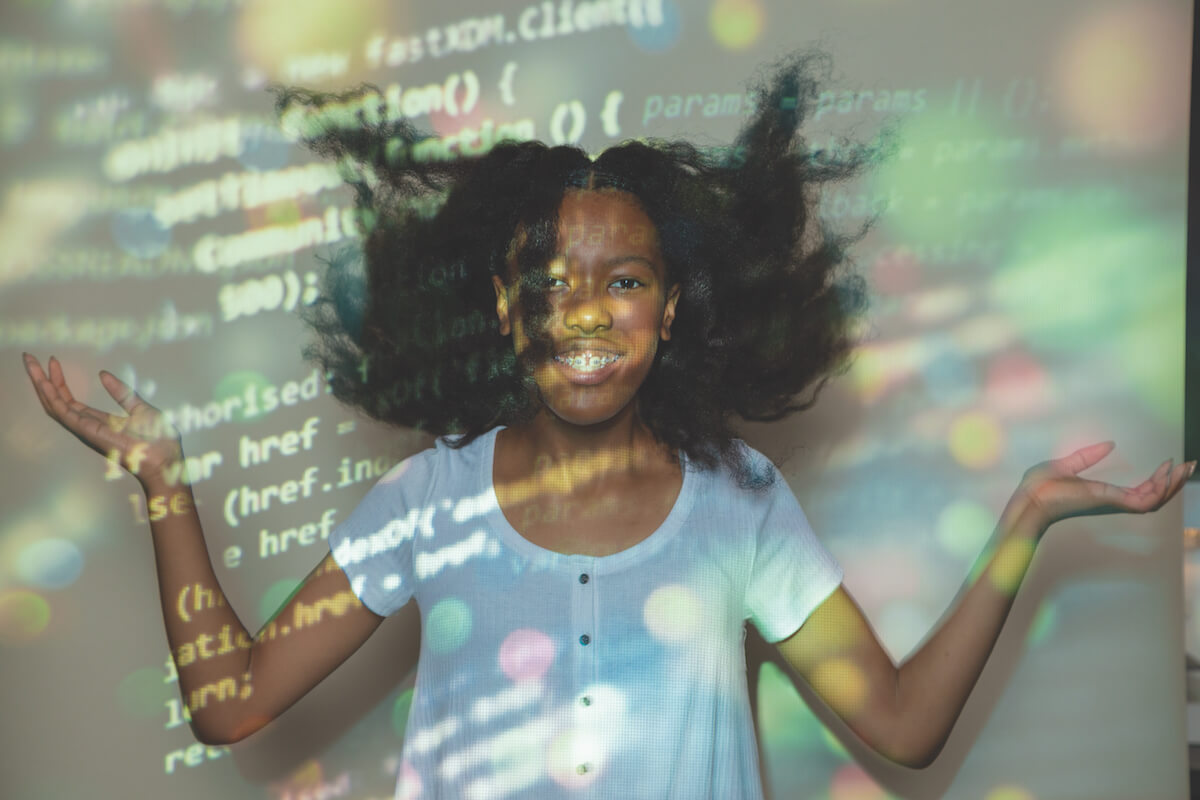
Kamilah Clark
Eighth Grade, George B. Dealey Montessori School, Dallas, Texas
Mentored by USC Viterbi students Christian Glover and Kourtney Chima
Biggest accomplishment: Learning eight coding languages including Object Oriented Java, XML and C++. Recently, I’ve been brainstorming about how to put those skills to work to build my next big project.
Grand challenge: Advancing personalized learning. I want to make a program that helps kids learn about the real world in an environment where they can feel free to be creative, write down all of their ideas and have specialized stations designed for that specific child’s brain. Imagine creating activities for children with similar interests and collecting data for the program so it can modify itself to fit that child. With these activities, children learn at their own pace. Right now, we’re not accounting for the fact that some kids just learn naturally faster or are more motivated. Why should we put them in a 12-year-long course just so they reach the same goals as other kids? Some kids may finish their course in 14 years, some may finish it in five, but we need to stop putting a time constraint on the child’s time for learning. My program will fit the new curriculum, but it will also allow legroom for kids to grow and reach the end at their own pace using smart e-tracking.
Heroes: My parents.
Favorite science experiment as a child: Ever since I was 7, I’ve been making games and projects on Scratch, a block-based coding platform for children. I made little games like “Dress Up Time” and “Find the Donut” using basic coding tutorials before expanding into more complex projects when I was about 10, creating simple autocorrect engines and manually making cloud lists and story mode games.
Favorite quote: “Just because you know you’re color blind doesn’t mean you can see the colors.” — Jaiden Animations, a popular YouTuber inside of her song “Empty,” featuring BoyInABand (Dave). That is, just because you’re aware of a bad habit or disorder, doesn’t mean you can automatically fix or reverse it.
Bucket list: Travel to Jamaica, finish my sci-fi novel, maintain an e-commerce website, develop a multi-page game UI in Android Studio and power an AI that can display its thoughts.
Favorite invention: My seventh grade science project, Create, a platform for young authors that encourages kids who otherwise wouldn’t read or write to learn more about literature, read more and understand that there is no age minimum to be an author.
If you could put a message on a billboard, what would it say? “Cause a chain reaction of kindness in your community; it all starts with a genuine compliment.” Either that or “And Peggy,” for all the “Hamilton” fans.
Significant teacher or mentor: Ms. Nicole, my kindergarten teacher. She empowered our entire class to stay ahead and be ourselves. She never underestimated us and [always] showed us respect. She taught us about black history and encouraged us to learn about our ancestors. But the most impressive thing she did was make all of this understandable to a 6-year-old.
Wildest dream: A world in which we can accept technology without misusing it. Ever since I got into computer science, I have been obsessed with the idea of genetically altering our DNA to save the data of a person’s mind and memories. If we were able to alter and monitor the fluctuation of the way our cells multiply, the way our DNA forms, we would be able to accomplish so many magnificent things. We could cure so many genetic diseases, prevent specific disorders or build the perfect immune system. People could see what their child would likely look like before they were born and alter their DNA to avoid cancers and genetic disorders, even replicate the human mind into a host. At the same time, this technology could mess up everything. “Hacking” the human body can become a major issue. Digital viruses and malfunctions can shut everyone and everything down, completely damaging the complex infrastructure of society. Yet I do believe this technology can create more good than evil, and the good should be the incentive to make it possible.
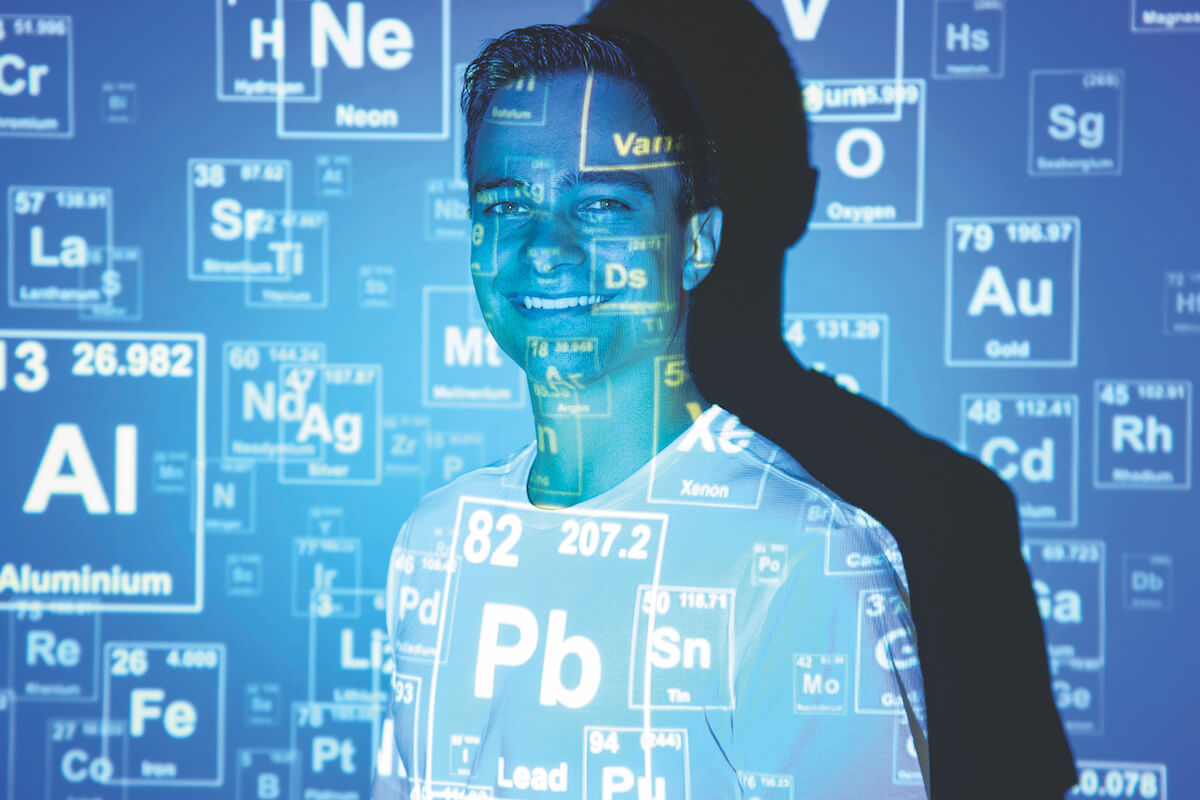
Daniel Donchev
M.S. EMT, ’19, B.S. BE, ’19, USC Viterbi
Biggest accomplishment: Serving as a USC Viterbi Freshman Academy coach to three incoming classes of engineering students for the past few years, and watching these students navigate their own unique path in college and develop into leaders on campus and within the community.
Grand challenge: Engineering better medicines: Creating affordable health care products that can augment lives and alleviate a large amount of the world’s population of physical, mental and emotional pain and suffering. I imagine a holistic, personalized health care program that targets mental, physical and emotional well-being. Each of these components would be evaluated periodically and treated as needed. The idea is that being healthy isn’t limited to one’s physical fitness, but is a combination of several forces working together. By tracking each over time, health care professionals are better positioned to assist their patients to live their best lives.
Heroes: Kobe Bryant, because of his unrelenting commitment to excellence during his illustrious basketball career and with all of his various post-retirement endeavors. My parents, because of the sacrifices they made and risks they took to move our family from Bulgaria to the United States.
Favorite science experiment as a child: Balloon baking soda experiment.
Favorite quote: “The less you open your heart to others, the more your heart suffers.” — Deepak Chopra
Bucket list: Visit space, attend a Lakers championship parade, perform music at a large venue.
Favorite invention: The iPhone — all that technology, in your pocket.
If you could put a message on a billboard, what would it say? “The way other people feel isn’t your problem, it’s your responsibility.”
Most significant teacher or mentor: Professor Geza Bottlik. I’ve taken two of his courses: an engineering economics class while studying abroad during the summer in Rome, and a statistics class as part of the progressive degree program in engineering management.
Wildest dream: To sign a 10-day contract with the Lakers, play for Bulgaria in the World Cup, and perform alongside Adam Levine at a music festival.
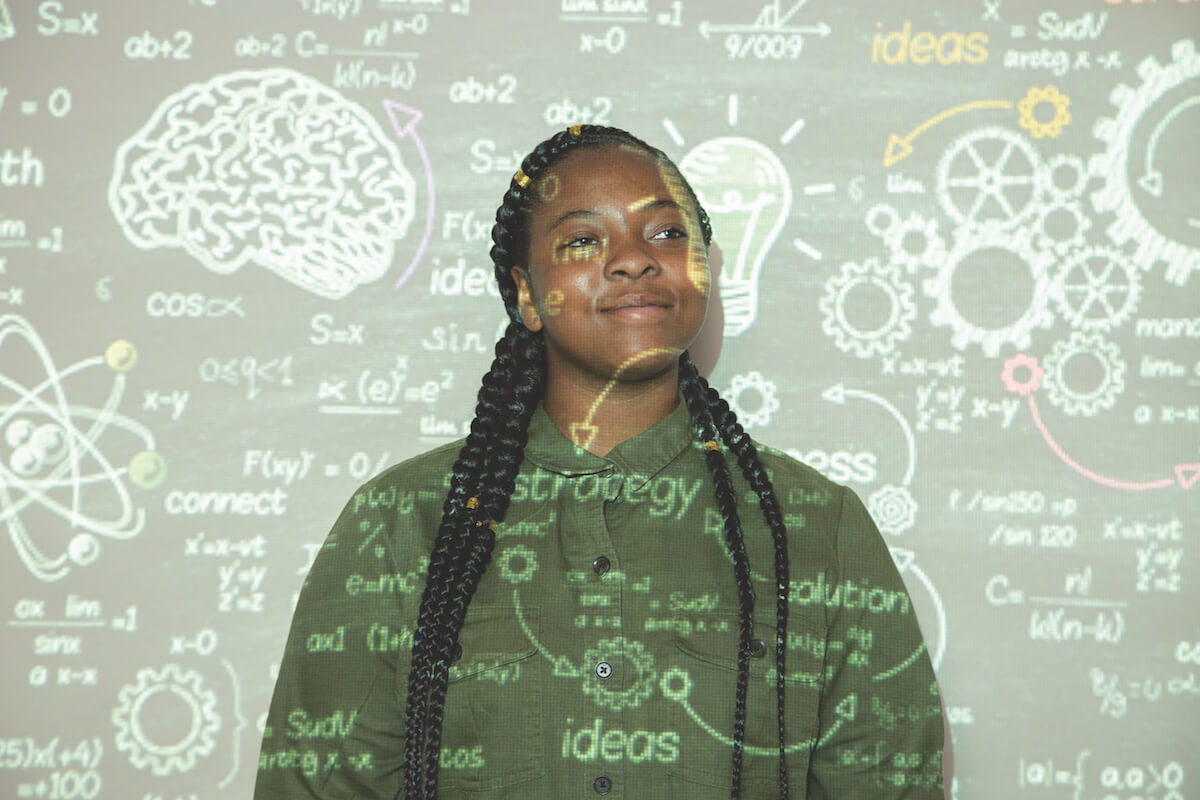
Adrienne Walker
10th Grade, Da Vinci Science High School, El Segundo, California
Mentored by USC Viterbi alums Avri Parker (B.S. ‘19) and Zixin Wang (B.S. ‘19)
Biggest accomplishment: Completing my first year of high school. I say this because I was really nervous going in, not knowing if I would fit in with certain groups or if my teachers would like me.
Grand challenge: Advancing personalized learning. I think it’s very important that each student approaches school by first exploring what type of learner they are. We could devise a system that observes how students engage and participate in class, and how they learn the Ayah League 12th Grade, Mayfair High School, Lakewood, California lesson. Based on the information gathered, we could customize education for students that have the same learning type.
Heroes: My parents and Alisha, a close family member. They have taught me not to give up and to always work hard because things are not always handed to me.
Favorite science experiment as a child: In physics class, my friend and I designed our own headphones using coiled wire and magnets. We soldered coiled wire and used two small plastic cups for the diaphragm to help get vibrations that helped produce sound.
Favorite quote: “For God has not given us a spirit of fear, but of power and of love and of a sound mind.” 2 Timothy 1:7
Bucket list: Have a house(s) and a family of my own, become a doctor, travel to another country or state, try South American and Caribbean food, own a car.
Favorite invention: Computers, because they have algorithms.
If you could put a message on a billboard, what would it say? “If you want to stay alive, then save the planet.”
Most significant teacher or mentor: My ninth grade algebra teacher, the first teacher who got me to actually like math and not be scared to solve problems in front of the class, help me want to help my fellow classmates with math problems they don’t get, and help me show progress on my math tests in her class. She helped me change my negative mindset on math into a growth mindset.
Wildest dream: Develop an app that would help people all over the world. I made an app with a group of friends at a STEM camp that won first place, and some people wanted to make it into a real app. But it did not happen. If it did, that would be awesome.
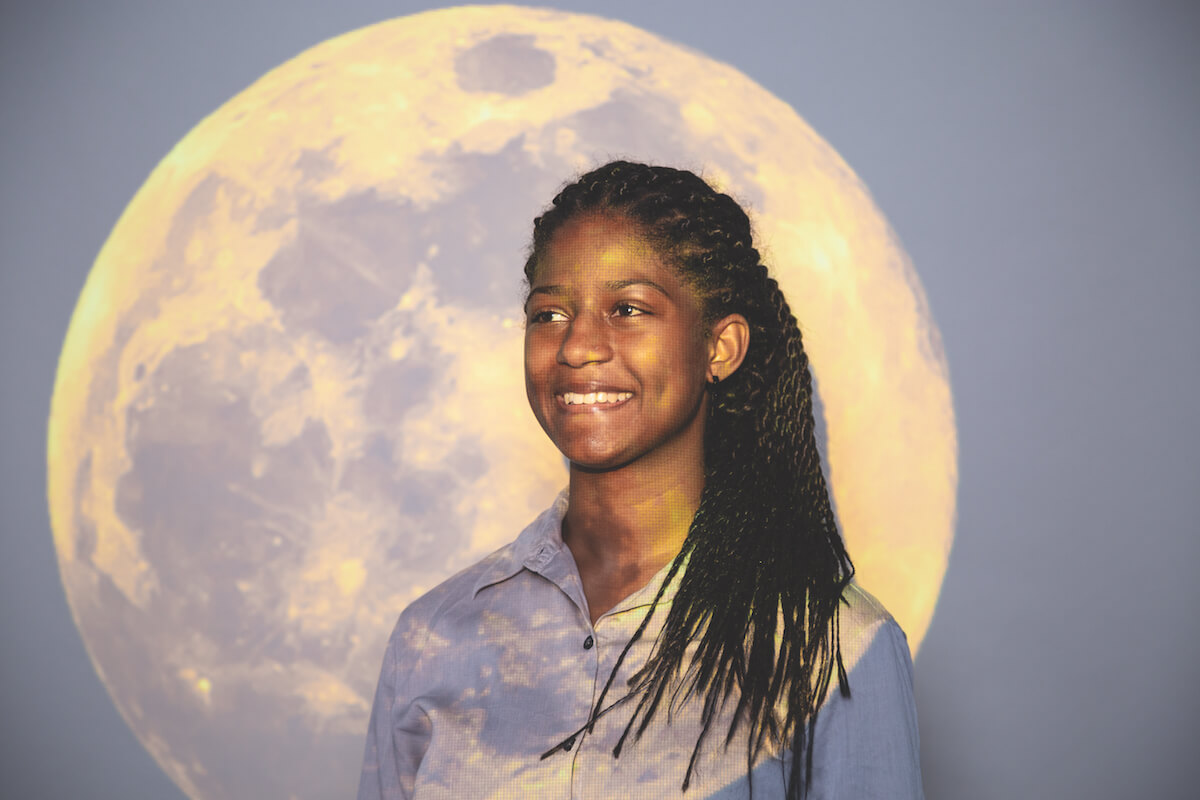
Ayah League
12th Grade, Mayfair High School, Lakewood, California
Mentored by USC Viterbi alums Nick Kaimakis (B.S. ‘19) and Sara Wiltberger (B.S. ‘17)
Biggest accomplishment: Being accepted to Cal Poly Pomona as a computer science major.
Grand challenge: Developing carbon sequestration methods. We have too much carbon dioxide in the atmosphere causing our planet’s heat levels to increase. We have already seen the effects of global warming with the Holy Fire in Northern California and Hurricane Florence in the Carolinas. Environmental tragedies such as these will become a part of our everyday lives if we don’t find a way to limit the amount of carbon dioxide in our atmosphere. Finding solutions should be at the forefront of research as these events are predicted to become prominent in 10 years. It’s a short amount of time when talking about the destruction of the world we live in.
Heroes: Elijah Daniel, comedian, rapper, music producer, songwriter, author and an advocate for the LGBT community. He uses his social status and business to donate to LGBT organizations.
Favorite science experiment as a child: Having to swab different areas of my school for germs. It showed me that there’s so much going on in the world, even things that aren’t visible to the eye.
Favorite quote: “Build a bridge and get over it.”
Bucket list: I only have one item on my bucket list: I want to be in a position either financially or publicly that will allow me to consistently support underrepresented communities.
Favorite invention: The VR headset If you could put a message on a billboard, what would it say? I wouldn’t put up a message. Billboard messages distract drivers and can cause accidents.
Most significant teacher or mentor: Sinnamon Garrett, my varsity basketball coach. She has coached me since I was 13 years old and has been an important part of my life.
Wildest dream: Meeting Lana Del Rey.



